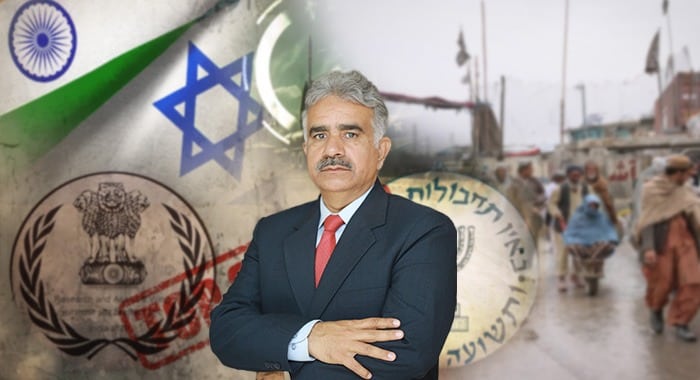Zahir Shah Shirazi
The recent revelations by former Afghan Army Deputy Chief and Intelligence Chief General Sami Sadat should serve as a wake-up call for Pakistan’s security establishment. In a startling admission, General Sadat acknowledged that the Islamic Emirate of Afghanistan is receiving funding from India and that this money is being used to fuel anti-Pakistan activities, including support for the Tehreek-e-Taliban Pakistan (TTP).
While Kabul continues to deny these allegations, Sadat’s words only confirm what Pakistan has long suspected: Afghan soil is being used as a staging ground for attacks against Pakistan, and the involvement of external intelligence agencies like RAW and Mossad is far deeper and more structured than previously imagined.
These are no longer whispers or intelligence briefings held behind closed doors. These are now public confirmations by high-ranking former Afghan officials with direct knowledge of operational mechanisms. The involvement of Afghan refugees—particularly unregistered individuals living illegally in Pakistan and Iran poses an acute national security risk. From Balochistan to Khyber Pakhtunkhwa, evidence continues to surface linking Afghan-linked actors to anti-state violence.
The recent arrest of a top Mossad operative, Shalom Darwish, posing as an Imam in Iran’s holy city of Qom, and the revelations surrounding his espionage ring, reinforce the seriousness of this threat. Darwish, reportedly the most important Mossad commander in the region, had infiltrated the religious and social fabric of Iran under the cover of religious scholarship. This is not an isolated event.
In Pakistan’s Swat region, similar incidents have come to light an Afghan national reportedly served as a mosque Imam for 25 years near Charbagh. Only upon his death was it discovered he was neither Muslim nor Pakistani. His mosque was later found equipped with sophisticated transmission and signal equipment. How many more such cases are operating in silence, hidden in plain sight?
These developments are neither coincidental nor isolated. They represent a calculated infiltration strategy targeting vulnerable areas through long-term sleeper agents. And more alarmingly, many of these operatives have allegedly entered Pakistan under the guise of refugees.
Pakistan is currently home to approximately 3.7 million Afghan nationals, many of whom remain undocumented. While the official number of Proof of Registration (PoR) card holders is around 1.4 million, and ACC card holders account for another significant chunk, there remains a large untraceable population of Afghan nationals in Pakistan living in urban centers as well as remote tribal districts.
The problem is twofold. First, there is a complete absence of biometric tracking or updated identification mechanisms. Second, law enforcement agencies continue to issue verbal NOCs for residence, business, and property rentals without proper vetting. This blind spot in Pakistan’s security architecture is being exploited with devastating effect.
If Iran—with its strict internal ideological unity and comparatively smaller Afghan refugee population—can be infiltrated so deeply, Pakistan’s vulnerability, given its ethno-linguistic diversity and administrative fragmentation, is exponentially greater.
Iran’s recent crackdown on Mossad’s spy network should be a case study for Pakistan. The arrest of operatives and the exposure of deep infiltration into Iranian institutions underline the scale of the threat. Unlike Pakistan, Iran has moved swiftly with surveillance, documentation, and mass deportations, planning to repatriate over 1.1 million Afghan nationals for security reasons.
Pakistan must follow suit. Sympathy must not come at the cost of sovereignty. The so-called “guests” who have been allowed to live on Pakistani soil for four decades have now become the linchpin of foreign-sponsored subversion.
Let us not forget the APS tragedy one of the canteen workers had no clear background and raised serious questions post-incident. If those connected to educational institutions can operate unchecked, the threat goes deeper than we admit.
The Pakistani state must now take firm and irreversible steps. A comprehensive biometric-based verification campaign must begin immediately—from provincial capitals to the most remote tehsils. All foreign nationals, legal or illegal, should be required to register, provide DNA or biometric data, and declare their income sources. Business operations by foreigners must be regulated through documented partnerships with Pakistani nationals, as is standard in countries like Saudi Arabia.
Security agencies must stop issuing NOCs based on verbal guarantees. All housing, rental, and business licenses should be processed only after digital verification through NADRA or equivalent intelligence-backed systems.
We can no longer afford vague sympathies. From RAW to Mossad, the networks operating under the guise of Afghan refugees are embedding themselves in our social, economic, and religious structures. The time for soft approaches is over.
Pakistan is not just facing a refugee crisis—it is confronting a slow-motion security implosion.





